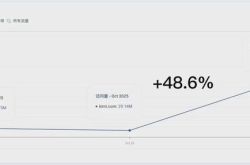"Reborn" OTA deserves a revaluation
![]() 10/22 2024
10/22 2024
![]() 477
477
Author | Mantis Observer
Written by | Qingyue
My close friend Xiao Ya has been frequently recommending rafting in Guizhou lately, trying to persuade me to accompany her on a weekend trip.
The reason is that when she was recently scrolling through Douyin, she found that many people were sharing videos of rafting in Guizhou. Sitting in a small inflatable boat on the choppy, foamy water, it looks terrifying, but Xiao Ya, who loves traveling and excitement, was immediately captivated.
However, Xiao Ya is easily swayed. After "Go to Where the Wind Blows" made Yunnan popular, she wanted to go to Dali to see Cangshan Mountain and Erhai Lake; when Zibo barbecue became a hit on Douyin, she planned to "rush to Zibo for grilling"; and last winter, when Harbin's ice and snow wonders frequently appeared on Xiaohongshu, she wanted me to accompany her to buy plane tickets to Harbin before she even had a down jacket ready...
It cannot be denied that in this era of information explosion and media convergence, film and television works and social media content are reshaping the landscape of the tourism market with unprecedented power.
In the face of this "external force," do OTA platforms, which have been deeply rooted in the tourism industry for years, feel a sense of crisis? At present, yes, but not much.
No longer content to be just an "intermediary," Douyin and Xiaohongshu are "overturning the table"
In fact, before film and television works and content recommendations became the key to rapid growth in tourism consumption, there was a long "honeymoon period" between content platforms like Douyin and Xiaohongshu and OTAs.
Back in 2018, when Douyin first ventured into tourism and hotel businesses, its main role was as an "intermediary," directing users to third-party platforms like Ctrip and Tongcheng for transactions. Xiaohongshu adopted a similar strategy, attracting attention through user-shared notes and ultimately guiding users to complete transaction loops on third-party platforms like Ctrip and Meituan.
However, as Douyin's daily active users approached 800 million and Xiaohongshu surpassed 100 million daily active users, the influence of these two content platforms in the tourism decision-making process became increasingly significant, almost becoming a must-visit destination for consumers planning their travels. This transformation not only boosted the popularity of multiple tourist destinations but also subtly shaped the direction of the tourism market.
According to big data calculations provided by the Harbin Municipal Bureau of Culture, Radio, Television, and Tourism, as of the third day of the New Year's holiday, Harbin had received a cumulative total of 3.0479 million tourist visits, generating a total tourism revenue of 5.914 billion yuan.
After the broadcast of "Go to Where the Wind Blows," the number of tourism searches for Dali, Lijiang, and other places in Yunnan surged, with year-on-year growth exceeding 50%. In particular, filming locations featured in the drama, such as Dali Ancient Town, Erhai Lake, and Shaxi Ancient Town, became popular tourist attractions that visitors scrambled to visit.
According to data from the Yunnan Provincial Department of Culture and Tourism, during the broadcast of the drama, the number of passengers arriving and departing from Dali Airport increased by more than 30% compared to the same period last year, and hotel bookings also increased significantly, with some high-end homestays even experiencing a shortage of rooms.
Furthermore, the tourism industry is a lucrative market. According to statistics from the Ministry of Culture and Tourism, in the first half of 2024, there were 2.725 billion domestic tourist trips, a year-on-year increase of 14.3%; and total domestic tourist spending reached 2.73 trillion yuan, a year-on-year increase of 19.0%.
So when content platforms discovered their increasing leverage in the tourism market, their ambitions grew, and they were no longer content with merely serving as "intermediaries" for traffic Import . Instead, they began actively infiltrating the transaction process.
In 2019, Douyin began directly connecting with hotel and travel merchants and gradually enabled booking functions on merchant homepages. Xiaohongshu partnered with "Dingdan Lailiao" in 2020 to attract homestay and hotel merchants to operate their businesses on the platform. In late April last year, Xiaohongshu began deploying group purchase projects, with some local lifestyle merchants launching accommodation and catering group purchase packages on their accounts.
Leveraging their vast user base and strong traffic advantages, content platforms have achieved some success in the tourism market. Taking Douyin as an example, as of September 2023, a total of 14,000 scenic spots and over 100,000 hotels had opened official accounts on Douyin. Specifically, for accommodation merchants, compared to the beginning of the year, the number of hotel POI stores increased by 61%, with the overall scale increasing month by month. In terms of order volume, during last year's National Day holiday, the number of Douyin hotel and travel orders increased ninefold year-on-year.
However, despite the growing influence of content platforms in the tourism market, providing rich tourism information for young "backpackers," the lion's share of the "cake" is still held by OTA platforms.
Biting off the largest piece of the "cake," is it time for OTAs to reassess their value?
Even in the face of the strong onslaught from "content breakers" like Xiaohongshu and Douyin, the established players in the online travel industry, led by Ctrip and Tongcheng, have still demonstrated strong growth resilience in the first half of this year.
The latest financial report data shows that Ctrip's revenue for the first half of this year was 24.709 billion yuan, a year-on-year increase of 20.69%, with a net profit attributable to shareholders of 8.145 billion yuan, a year-on-year increase of 103.32%; Tongcheng Travel's revenue was 8.11 billion yuan, with a high year-on-year growth rate of 48.8%; adjusted net profit was 1.22 billion yuan, a year-on-year increase of 10.9%, with the second quarter setting a new record for quarterly revenue.
In the face of the strong incursion of content platforms, OTA platforms have managed to remain stable and deliver such an impressive "report card" for several reasons. On the one hand, OTA platforms were earlier in occupying the mindset of new-generation consumers.
According to survey reports released by travel booking platforms such as Expedia, new-generation consumers such as Gen Z and Millennials place greater emphasis on experience, convenience, and personalization in their travel spending. When booking travel products, they tend to use OTA platforms because platforms like Ctrip and Tongcheng can provide one-stop services, allowing them to book flights, hotels, car rentals, tickets, and other travel products on the same platform, significantly saving time and effort.
So while these young backpackers may decide where to go based on Douyin and Xiaohongshu, they tend to prefer OTA platforms like Ctrip and Tongcheng when planning their trips and booking products.
On the other hand, tourism products have the characteristic of being "non-standardized," requiring high coordination and cooperation among hotels, scenic spots, local travel agencies, and other links. Obviously, in these "back-end" services, OTA platforms like Ctrip and Tongcheng have more advantages.
For example, Ctrip divides the entire fulfillment process before, during, and after group tours into more than 70 detailed segments and formulates detailed service standards for each segment, significantly improving service quality and customer satisfaction.
Furthermore, based on its platform technology innovation capabilities, Tongcheng continuously accelerates the digital transformation of transportation, accommodation, scenic spots, and destinations. It also integrates practical information such as regional transportation, food, and tourism methods through digital technology to achieve automatic navigation, smart maps, VR bookings, AI smart customer service, and other functions, successfully addressing service pain points before, during, and after travel.
More importantly, high-end hotels, offline scenic spots, travel agencies of all sizes, individual guides, travel photography teams, and other supply chains require significant time to accumulate expertise. OTA platforms like Ctrip and Tongcheng have a deeper accumulation in this regard than Douyin and Xiaohongshu.
For example, in recent years, reverse tourism, which involves avoiding popular tourist attractions and cities and choosing relatively obscure, niche destinations, has become a popular choice among young backpackers.
During the National Day holiday in 2022, the number of hotel bookings in "obscure" tourist cities on Qunar.com increased by more than 30% year-on-year compared to 2021. Bookings for four- and five-star hotels in cities like Linxia in Gansu, Shizuishan in Ningxia, Haibei in Qinghai, Bayannur in Inner Mongolia, and Suining in Sichuan increased by more than tenfold year-on-year in October compared to 2021.
Some niche third- and fourth-tier cities are difficult for Douyin and Xiaohongshu to fully cover, but Tongcheng Travel, which aspires to be the "Pinduoduo" of the tourism industry, has proactively positioned and laid out in the lower-tier markets, successfully capturing this "rich mine" of the lower-tier market.
In 2020, Tongcheng began focusing on penetrating the lower-tier markets. Today, its eLong Hotel Technology platform has nearly 1,800 hotels in operation and over 2,600 signed hotels, covering 280 municipalities and prefecture-level cities in China. Moreover, as of the end of 2023, registered users from non-first-tier cities in China accounted for 86.9% of Tongcheng Travel's total user base.
It can be foreseen that while Douyin and Xiaohongshu can leverage traffic and content to leverage a portion of the tourism market, they ultimately serve as a "bridal gown" for traditional OTA platforms like Ctrip and Tongcheng Travel. In the future, as consumption and investment both recover, a group of outstanding enterprises led by Ctrip and Tongcheng Travel may enter a "hitting zone" for value reset.
*All images in this article are sourced from the internet







